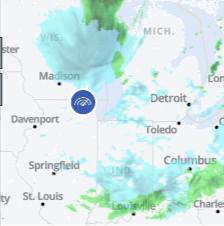Chicago police failed to properly interview eyewitnesses and sought to get witnesses to change their story of how a fellow officer shot a 17-year old 16 times – that is the claim made by attorneys for the family of Laquan McDonald, who was shot and killed on October 20, 2014.
The Cook County Medical Examiner ruled McDonald’s death a homicide.
“Without question this is not a legitimate investigation of a fatal shooting, without question,” said Michael Robbins, one of two attorneys representing McDonald’s family. He and his co-counsel Jeff Neslund spoke in their first television interview regarding the shooting.
The version of what happened in the 4100 block of South Pulaski that night from the Fraternal Order of Police and what is seen on a police dashboard camera, according to the attorneys, is diametrically opposed.
Chicago police officers responded that night to a man with a knife trying to break into cars and slashing tires. They tracked him for several blocks to 41st and Pulaski, asking for backup and a Taser.
McDonald, according to police, had a dazed look, cut the tires of a police car, smashed a window and “was coming at the officer.” That’s when a single officer opened fire.
Pat Camde, the spokesman for the Fraternal Order of Police, said that night the preliminary investigation showed McDonald was a “very serious threat.”
Local
“He now has the knife fully in his hand, going at one of the officers," Camden told reporters, “At that point the officer defends himself.”
But the attorneys for McDonald’s family said Camden’s account is completely wrong and that McDonald did not lunge or make a threatening move toward police when he was shot.
“Oh, absolutely not,” Jeff Neslund said.
“He’s moving away from the officer,” Robbins said. “He never moved toward the officer.”
Independent journalist Jamie Kalven investigated and wrote about what happened on Pulaski Road that night shortly before 10:00 p.m.
“The officer takes out his gun, shoots Laquan McDonald [and] the boy falls to the ground, he’s immobilized,” Kalven said in an interview. “He’s since been described in a fetal position.”
“I’ve found one witness with a clear line of vision and he described…one shot and then multiple shots while the boy’s on the ground," Kalven said.
The Cook County Medical Examiner said McDonald was shot 16 times. The autopsy noted he had a small amount of PCP or angel dust in his system.
“Nine out of the 16 were entrance wounds to his back or back of his foreman or back on his hands. Two shots were directly into his back,” Robbins said.
“You can see in the video as he is lying on the ground that he is being shot while he is on the ground,” Neslund said after viewing footage from that night.
The video is from a dashboard camera from one of the police cars. It has not been made public, though the attorneys have a copy.
The attorney for the officer who fired the fatal shots said he “maintains he acted within department guidelines and was justified in utilizing deadly force.”
There were witnesses to what occurred that night, including Alma Benitez.
“[McDonald] just stood there and the next thing you know they fired,” Benitez said.
The attorneys say police ordered some witnesses to leave the scene under threat of arrest.
“They didn’t take statements, they didn’t take contact information from these people,” Robbins maintains. “These are occurrence witnesses who saw a fatal shooting and police are telling them to get out or be arrested.”
Three witnesses were taken to Area 1, according to the attorneys, where one allegedly told police Laquan McDonald was executed.
“This witness told us this was an execution, that’s his word," Neslund said. "And he told police on the scene and he told police at the station, this was an absolute execution. He told us they were screaming at him, they told him to change his story, they were angry.”
The attorneys said the witnesses they spoke to did not have not their statements videotaped or audiotaped.
On March 13th the city of Chicago agreed to a $5-million dollar settlement, even without a lawsuit being filed. The settlement was first approved by the alderman in the Finance Committee and on April 15th before the full City Council without debate or comment.



